Looking for a LivePerson alternative that fits your needs? Businesses today rely on digital customer interaction solutions to engage customers effectively and improve customer satisfaction scores. While LivePerson is a well-known customer messaging platform, it may not suit every business due to pricing, features, or specific integration needs.
This guide will explore the top LivePerson alternatives to help you find a platform that streamlines customer interactions, supports various messaging channels, and enhances customer experiences. Whether you’re managing a small team or a large enterprise, there’s a solution here for every need. Let’s get started!
Criteria for Choosing a Live Chat Platform
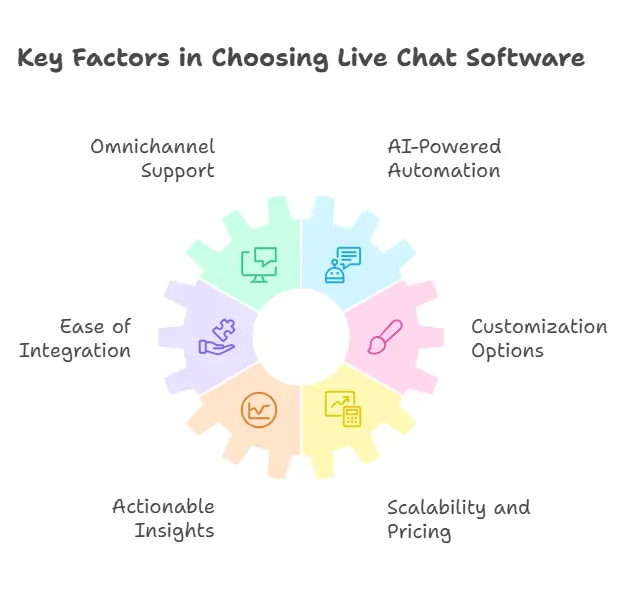
Finding the right live chat software starts with understanding what features matter most for your business. Different platforms cater to specific needs, whether it’s advanced AI capabilities, seamless integration with third-party tools, or support for various messaging channels. Here are some key factors to consider:
Omnichannel Support
Ensure the platform allows you to meet customers on their preferred digital channels, such as live chat, voice calls, video calls, Facebook Messenger, and other popular messaging channels. Providing omnichannel support can improve customer satisfaction and service efficiency.
AI-Powered Automation
Look for platforms offering AI-powered chatbots and automation features. These tools enable proactive engagement, guide customers with personalized conversations, and streamline processes to save time.
Ease of Integration
A good customer engagement platform should provide deep integrations with your favorite tools, CRMs, and other software. Seamless integration ensures you can leverage customer data and improve agent performance.
Customization Options
From custom dashboards to chat widgets, the ability to tailor features according to your brand and customer needs is vital. Customization ensures a more seamless customer experience.
Actionable Insights
Choose a platform with robust reporting features, like custom dashboards and analytics tools. These insights help track customer inquiries, measure agent performance, and optimize your service for higher customer satisfaction scores.
Scalability and Pricing
Whether you’re a small team or a growing business, the platform should align with your budget and scale as your needs evolve. Features like free plans, starter plans, and team plans can be helpful for businesses at different stages.
By focusing on these criteria, you’ll be better equipped to pick a platform that enhances customer experiences and streamlines operations. Next, let’s dive into the top 10 LivePerson alternatives and how they stack up.
Top 10 LivePerson Alternatives
1. Desku
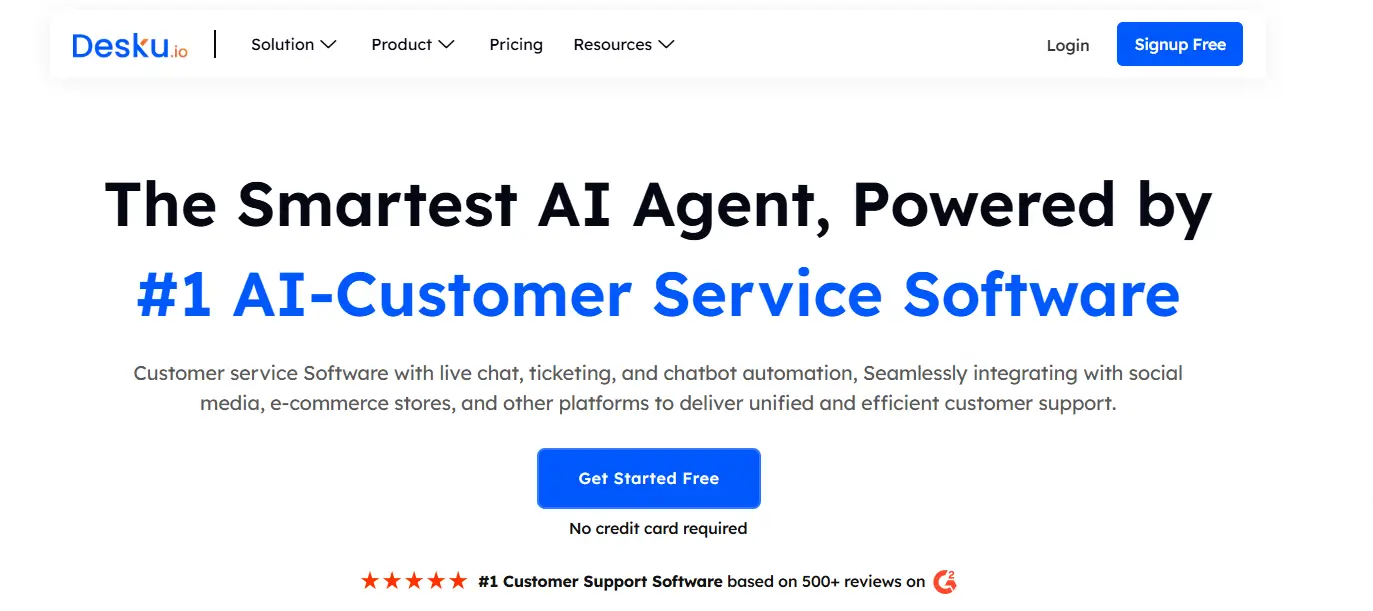
Desku is an excellent LivePerson alternative designed to simplify customer interactions for small and medium-sized businesses. With its intuitive user interface and a focus on providing a seamless customer experience, Desku empowers teams to streamline processes and improve service efficiency.
Key Features:
- Omnichannel Support: Engage customers across multiple channels like live chat, email, and social media platforms, including Facebook Messenger.
- AI-Powered Chatbots: Automate repetitive tasks and guide customers with personalized conversations.
- Customization Options: From chat widgets to custom dashboards, Desku allows businesses to create tailored experiences.
- Real-Time Chat and Co-Browsing: Offer instant assistance to website visitors and provide hands-on support with screen sharing.
- Actionable Insights: Access robust reporting features to track customer inquiries, measure agent performance, and capture leads.
Pros:
- Affordable starter plans for small teams.
- Easy integration with third-party tools and CRMs.
- Comprehensive knowledge base and self-service options.
Cons:
- Limited advanced AI capabilities compared to some larger platforms.
- Certain automation features are only available in premium plans.
Pricing Overview: Desku offers a free trial, with pricing plans tailored for small teams and growing businesses. Their team plan is ideal for those looking for scalability and advanced features.
Best For:
- SaaS companies, e-commerce businesses, and customer support teams looking for a cost-effective, user-friendly platform to engage customers.
2. Zendesk
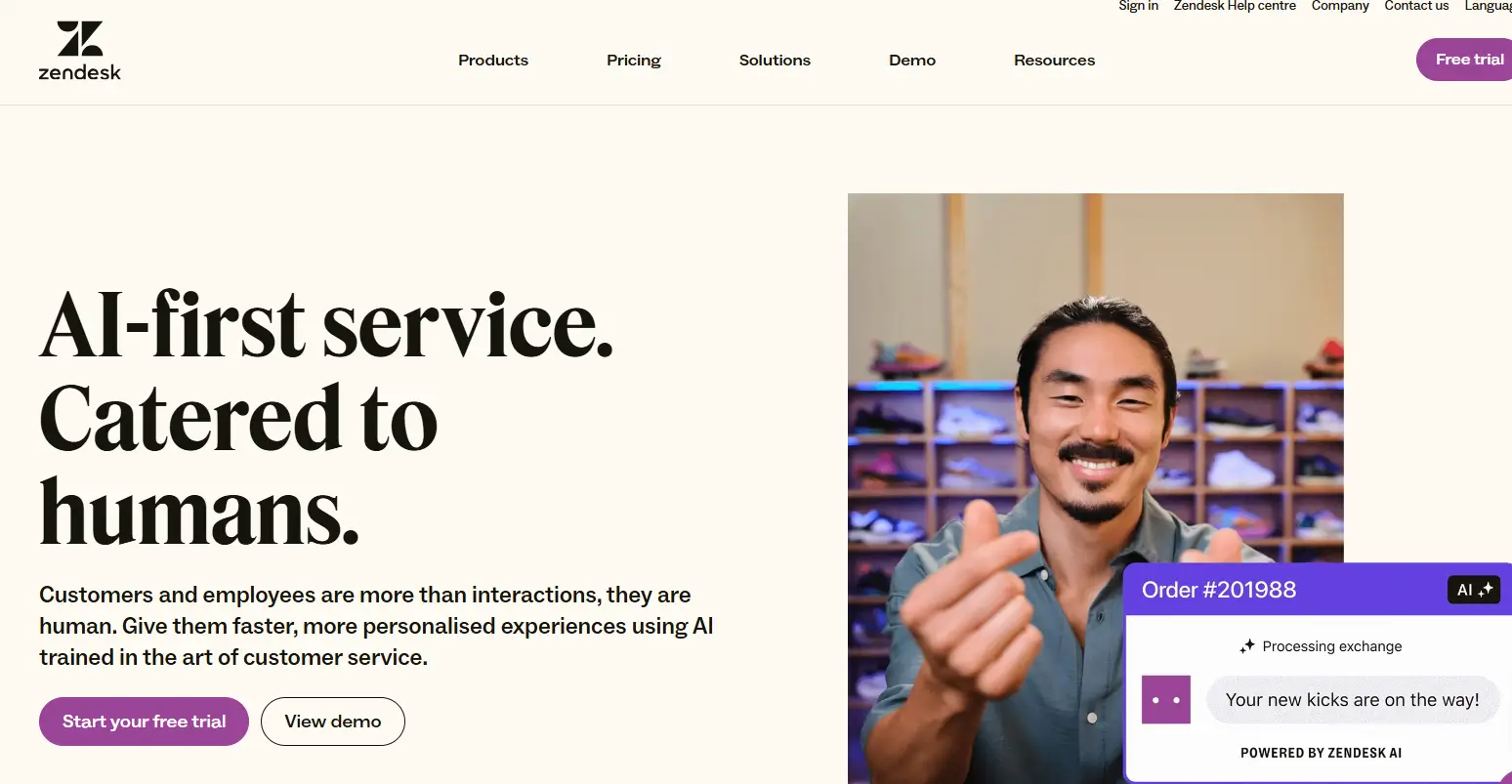
Zendesk is a well-known customer engagement platform that provides comprehensive tools for managing customer interactions across various channels. Its robust features and scalability make it a preferred choice for businesses of all sizes, from small teams to large enterprises.
Key Features:
- Omnichannel Support: Handle customer inquiries through live chat, email, voice calls, and social media.
- Advanced AI Capabilities: Use AI-powered automation to deliver targeted messages and improve service efficiency.
- Custom Dashboards and Reporting Tools: Track key metrics like customer satisfaction scores, agent performance, and response times.
- Knowledge Base: Offer customers self-service options to resolve common issues quickly.
- Deep Integrations: Seamlessly integrate with CRMs, analytics tools, and other favorite tools.
Pros:
- Highly scalable, making it suitable for businesses of any size.
- Excellent reporting features for actionable insights.
- A wide range of customization options for tailoring the user experience.
Cons:
- Pricing may be steep for smaller teams.
- Can be complex for new users to navigate initially.
Pricing Overview: Zendesk offers various plans, from basic support to advanced enterprise solutions. While its starter plans are more affordable, additional features like automation features and advanced analytics come with higher tiers.
Best For:
- Customer support managers and large-scale businesses seeking robust, scalable solutions with advanced AI and reporting features.
3. Freshdesk
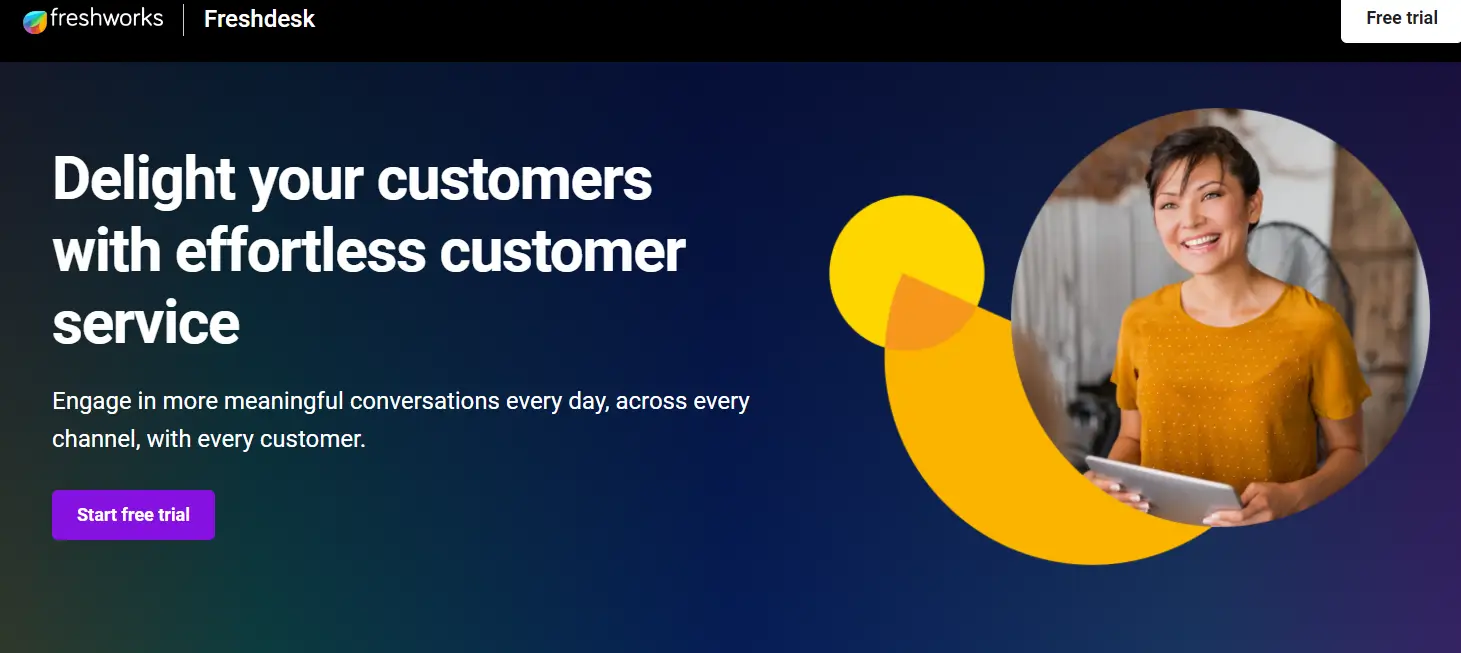
Freshdesk is a popular live chat software known for its simplicity and ease of use. It’s designed to help businesses engage customers and enhance team collaboration while providing excellent support.
Key Features:
- Multiple Channels: Supports live chat, email, and integration with popular messaging channels like WhatsApp and Facebook Messenger.
- AI-Powered Automation: Includes chatbots to streamline customer service processes and enable proactive engagement.
- Team Collaboration Tools: Features like shared inboxes and internal notes to improve communication.
- Customization Options: Offers tailored chat widgets and automation workflows.
- Mobile Apps: Manage customer interactions on the go.
Pros:
- Simple, intuitive user interface.
- Great value for small to medium-sized businesses.
- Offers a free plan for basic features.
Cons:
- Limited advanced AI functionalities compared to enterprise-level tools.
- Some integrations require higher-priced plans.
Pricing Overview: Freshdesk offers a free plan for small teams and affordable paid plans with additional features. Their team plan is an excellent option for growing businesses.
Best For:
- Small businesses and customer service teams looking for an affordable, easy-to-implement solution.
4. Intercom
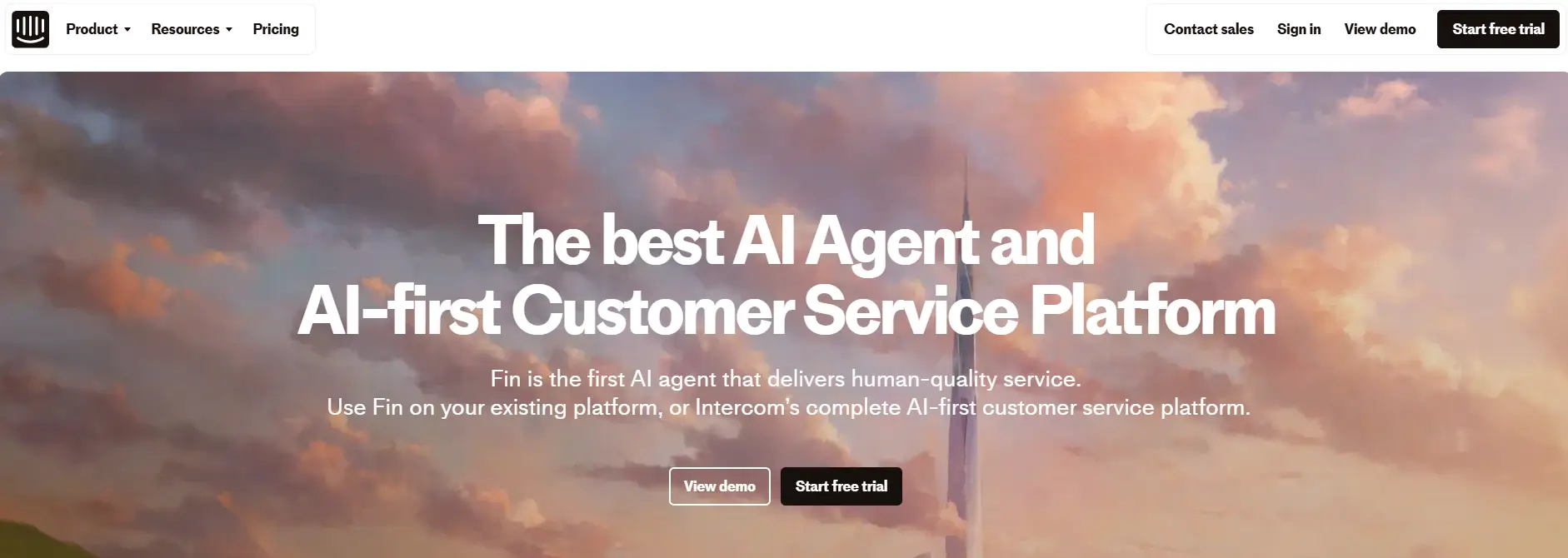
Intercom is a versatile customer engagement platform designed for businesses seeking a personalized approach to customer interactions. Known for its sleek design and advanced capabilities, Intercom focuses on proactive engagement and tailored experiences.
Key Features:
- Conversational AI: Automate responses with AI-powered chatbots and provide personalized conversations to guide customers effectively.
- Proactive Engagement: Use targeted messages to reach website visitors at the right time.
- Omnichannel Support: Connect with customers via various messaging channels, including live chat, email, and social media.
- Actionable Insights: Leverage robust analytics to improve agent performance and track customer satisfaction scores.
- Product Tours: Help users navigate your platform with interactive guides.
Pros:
- Excellent for businesses focused on lead generation and customer inquiries.
- Customizable chat widgets and dashboards.
- Strong integration capabilities with favorite tools.
Cons:
- Pricing can be high for small teams.
- Certain advanced features require premium plans.
Pricing Overview: Intercom offers flexible pricing plans based on features and usage, making it suitable for both small businesses and enterprises.
Best For:
- SaaS companies and e-commerce businesses looking to engage customers with proactive, personalized support.
5. Tidio
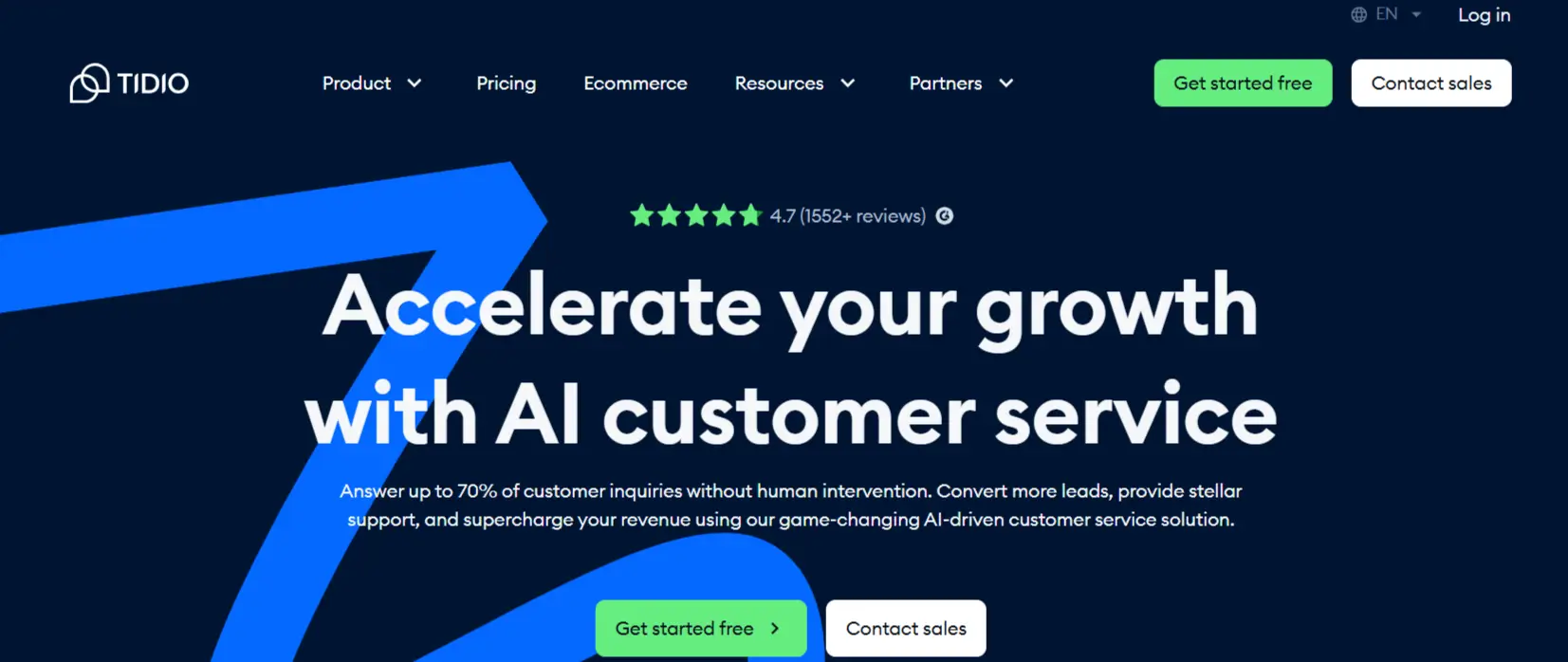
Tidio is a lightweight and affordable live chat software that combines simplicity with functionality. It’s ideal for small and medium businesses looking to streamline customer interactions without breaking the bank.
Key Features:
- Live Chat and AI Chatbots: Enhance real-time chat with automation for handling common queries.
- Omnichannel Support: Centralize conversations from multiple channels like email and social media.
- Customization Options: Design your chat widget to match your brand’s style.
- Mobile Apps: Respond to customer inquiries on the go.
- Reporting Features: Monitor metrics like response times and customer satisfaction scores.
Pros:
- Simple to set up and use.
- Budget-friendly with a free plan available.
- Strong focus on automation features.
Cons:
- Limited features for large teams or enterprises.
- Basic reporting tools compared to higher-end platforms.
Pricing Overview: Tidio offers a free plan with basic features and affordable upgrades for advanced functionalities.
Best For:
- Small businesses and customer support teams seeking a cost-effective, easy-to-use solution.
6. LiveChat
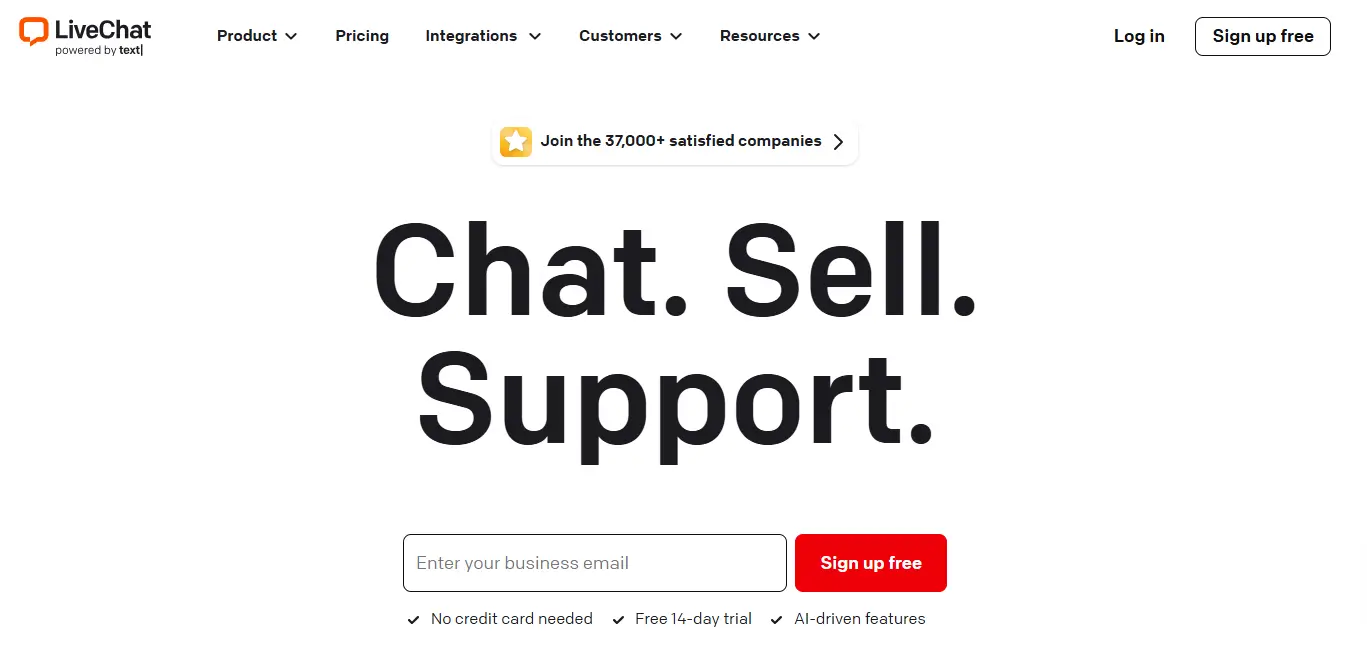
LiveChat is a powerful and professional customer messaging platform that offers extensive features for improving service efficiency and customer satisfaction. Its focus on real-time support makes it a standout choice for customer service teams.
Key Features:
- Live Chat and AI-Powered Chatbots: Deliver real-time chat while automating repetitive tasks.
- Custom Dashboards: Track metrics like agent performance and lead capture rates.
- Seamless Integration: Works with third-party integrations and CRMs for a unified workflow.
- Knowledge Base: Enable self-service options to reduce agent workload.
- Omnichannel Support: Manage inquiries across digital channels, including social media.
Pros:
- Feature-rich and highly customizable.
- Excellent for capturing leads and improving customer satisfaction scores.
- Strong AI-powered automation capabilities.
Cons:
- Pricing may be prohibitive for small businesses.
- Some advanced features are locked behind higher plans.
Pricing Overview: LiveChat offers flexible plans based on team size and feature requirements, with options for small businesses and enterprises.
Best For:
- Customer service teams and customer support managers looking for a feature-rich platform with robust automation.
7. Olark
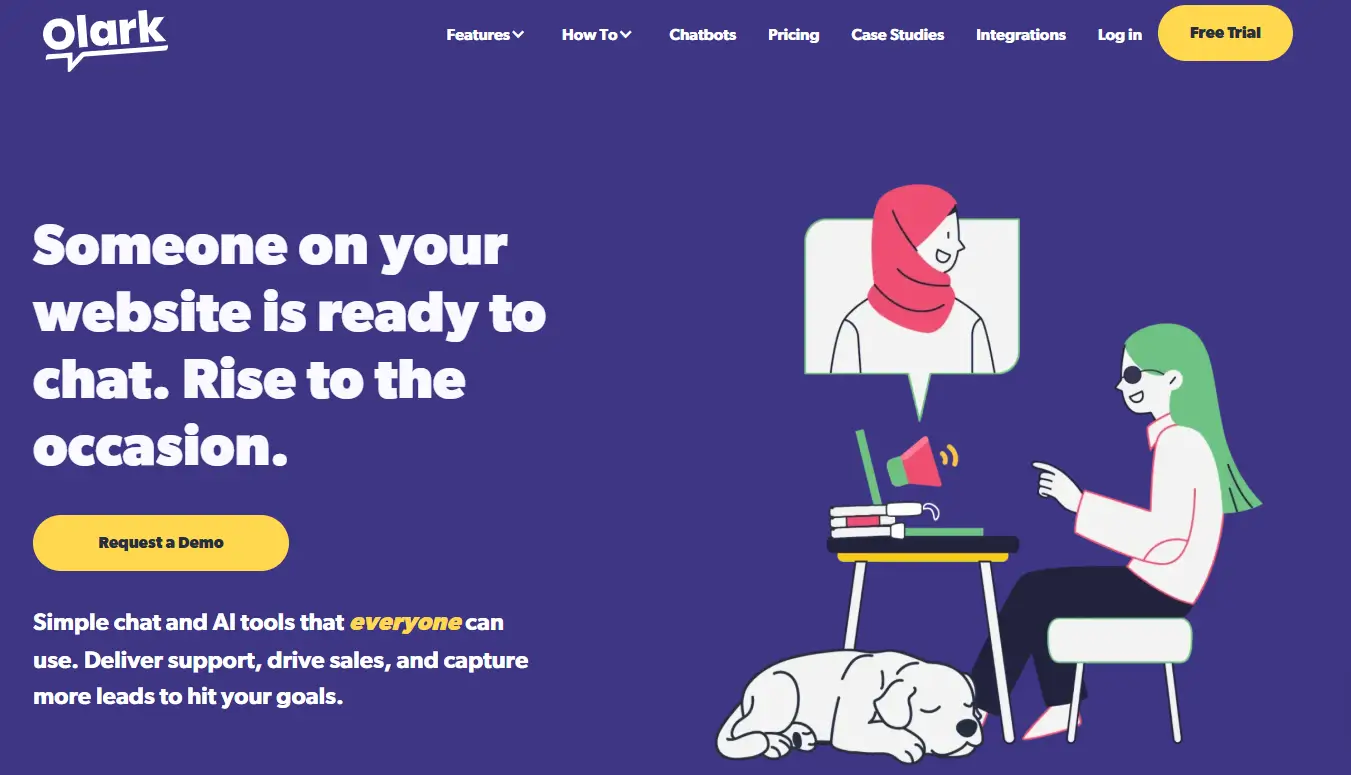
Olark is a simple yet effective live chat software that focuses on helping small businesses and support teams deliver exceptional customer experiences. Its straightforward interface and customizable features make it a go-to choice for teams aiming to engage customers efficiently.
Key Features:
- Live Chat with Automation Features: Streamline customer interactions with features like automated messages and pre-chat forms.
- Customization Options: Tailor your chat widget to match your branding.
- Reporting Tools: Access actionable insights on customer inquiries and agent performance.
- Seamless Integration: Works well with CRMs and other business tools for a unified workflow.
- Offline Messaging: Ensure no query goes unanswered with offline message collection.
Pros:
- Easy to set up and manage.
- Affordable pricing plans, ideal for small teams.
- Lightweight and user-friendly interface.
Cons:
- Limited advanced AI features.
- Basic reporting compared to competitors.
Pricing Overview: Olark offers straightforward pricing with plans designed for small and growing businesses. Additional features can be purchased as add-ons.
Best For:
- Small businesses and customer service teams needing a simple, cost-effective chat solution.
8. Chatbot.com
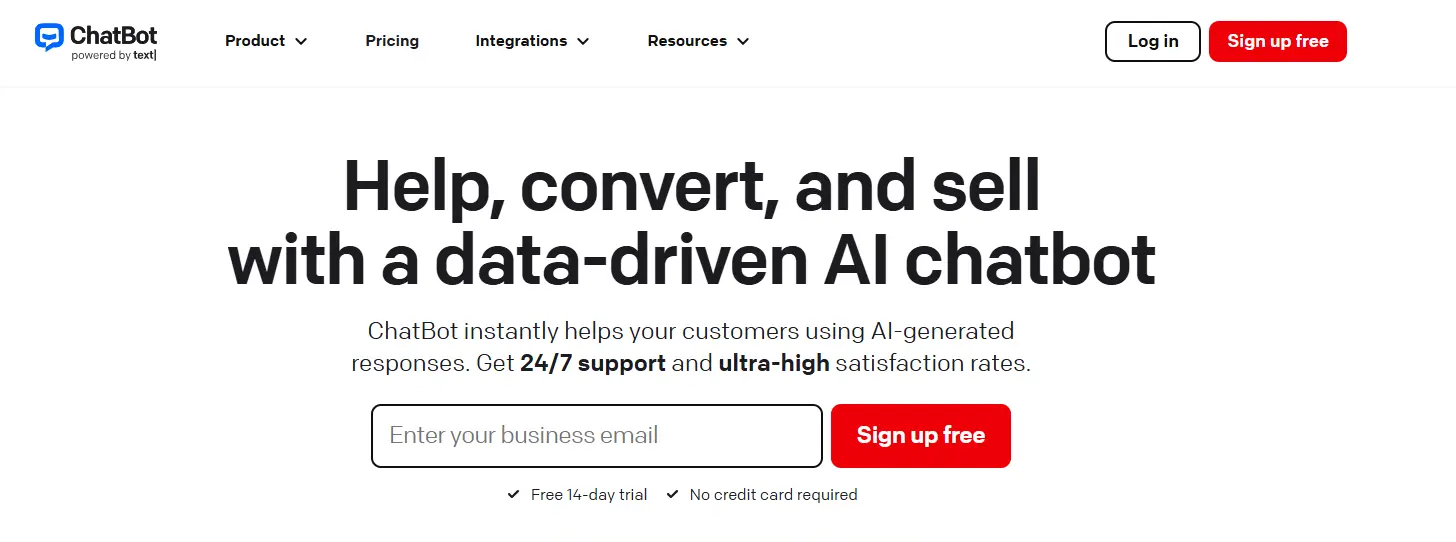
Chatbot.com specializes in AI-powered automation and conversational AI, making it a great LivePerson alternative for businesses looking to scale their support without increasing agent workload. Its focus on automation helps guide customers while reducing response times.
Key Features:
- AI-Powered Chatbots: Handle repetitive queries and engage customers with targeted messages.
- Custom Dashboards: Monitor performance and optimize workflows with detailed analytics.
- Third-Party Integrations: Seamlessly connect with CRMs and other tools to enhance efficiency.
- Knowledge Base Integration: Provide self-service options for common issues.
- Proactive Engagement: Use chatbots to anticipate and address customer needs.
Pros:
- Strong focus on automation and efficiency.
- Easy to integrate with existing tools.
- Highly customizable chatbot features.
Cons:
- Limited live chat functionality compared to hybrid platforms.
- Advanced features may require technical expertise.
Pricing Overview: Chatbot.com offers scalable pricing based on usage and features, with a focus on providing value for businesses implementing AI.
Best For:
- SaaS companies and e-commerce businesses prioritizing automation and proactive support.
9. Zoho Desk
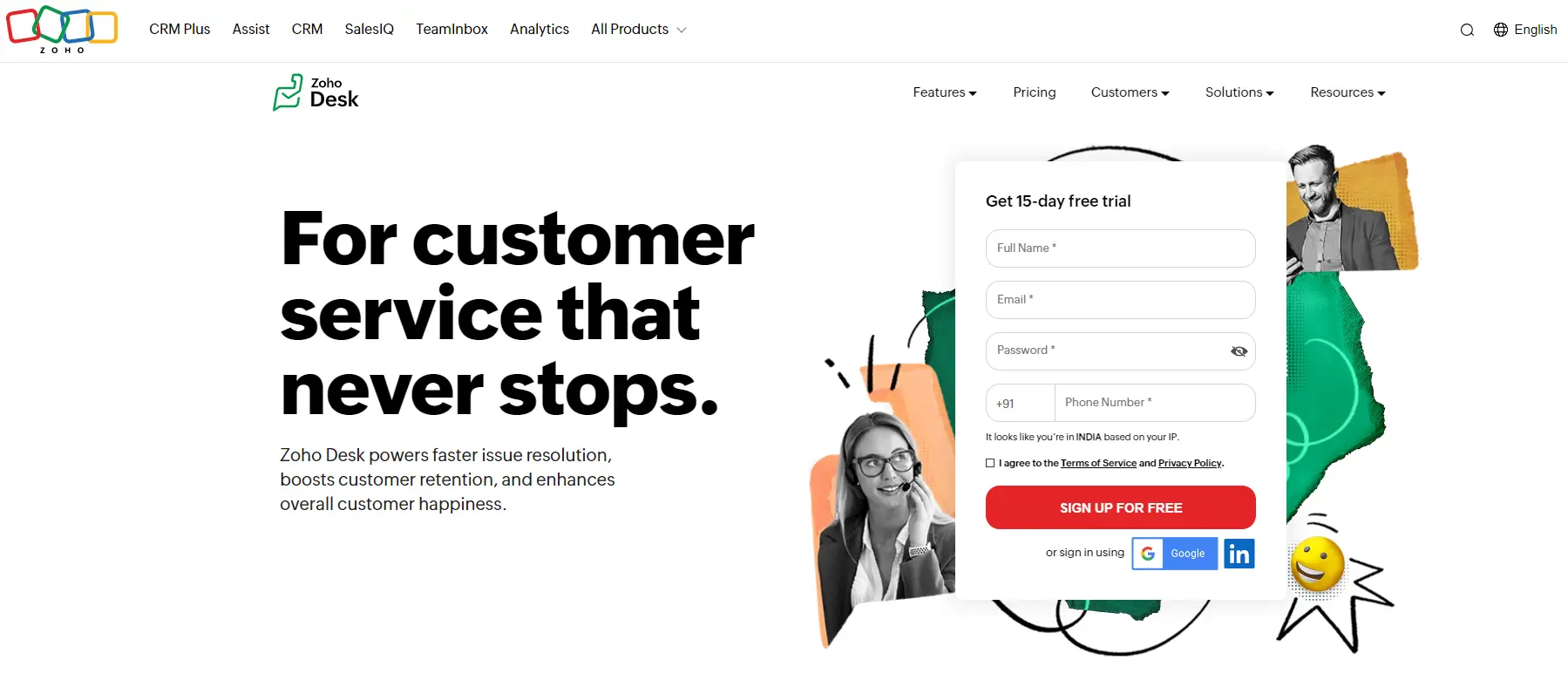
Zoho Desk combines live chat with robust help desk capabilities, offering an all-in-one solution for managing customer interactions. Its deep integrations with other Zoho tools make it a standout choice for businesses already in the Zoho ecosystem.
Key Features:
- Omnichannel Support: Manage inquiries from various channels, including email, live chat, and social media.
- AI-Powered Automation: Use Zoho’s AI assistant, Zia, for automating tasks and analyzing data.
- Custom Dashboards and Reports: Track metrics like customer satisfaction and agent performance.
- Knowledge Base: Enable self-service options to reduce support workload.
- Seamless Integration: Works perfectly with Zoho’s suite of tools and other third-party software.
Pros:
- Affordable for small to medium-sized businesses.
- Deep integration within the Zoho ecosystem.
- Strong focus on ticketing and reporting features.
Cons:
- Limited appeal for businesses not using other Zoho tools.
- Fewer chatbot features compared to specialized platforms.
Pricing Overview: Zoho Desk offers flexible pricing plans with affordable options for small teams and advanced features for larger organizations.
Best For:
- SMBs and customer support teams looking for an integrated help desk and chat solution.
10. Drift
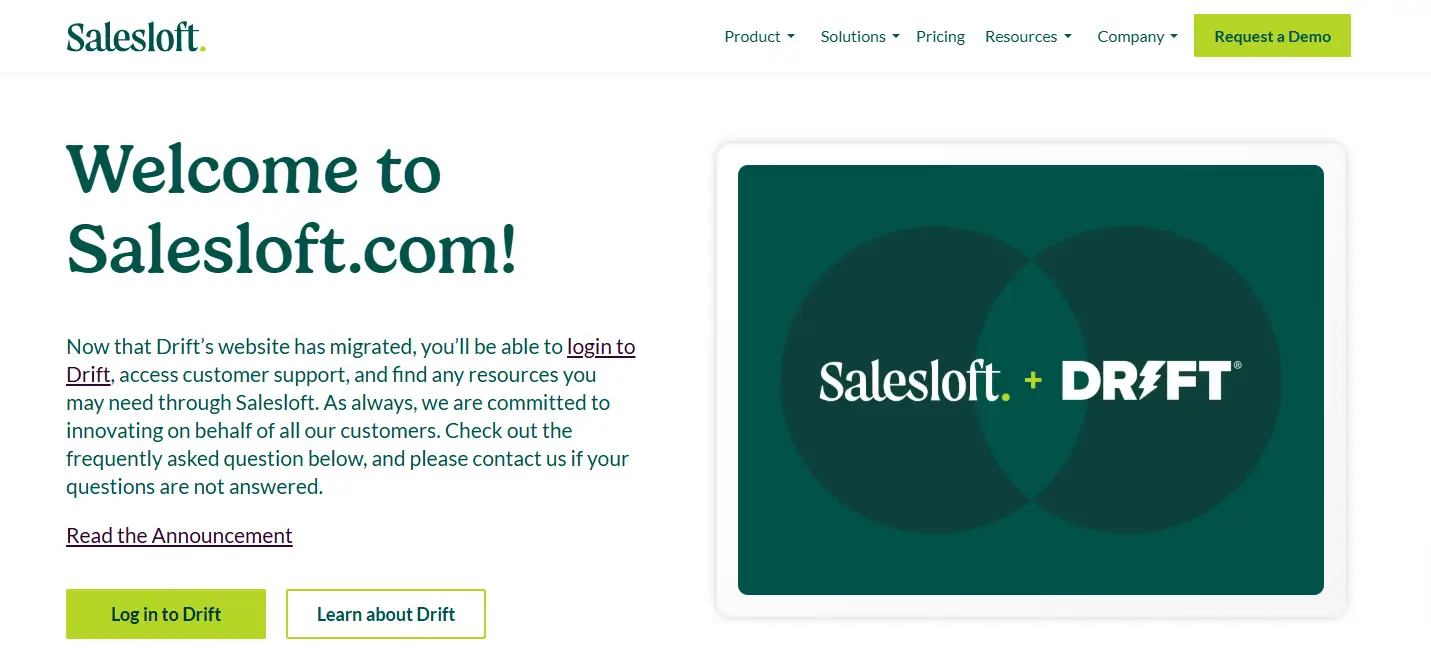
Drift is a high-end customer messaging platform focusing on sales and marketing alongside customer support. With features designed for lead generation and proactive engagement, Drift is ideal for businesses looking to streamline sales and support efforts.
Key Features:
- Conversational AI: Use AI to engage customers, answer queries, and qualify leads.
- Proactive Support: Send targeted messages to website visitors to encourage action.
- Advanced Reporting Tools: Monitor agent performance, track customer inquiries, and analyze lead conversion rates.
- Integration Capabilities: Works seamlessly with CRMs and marketing tools.
- Screen Sharing and Video Calls: Offer hands-on assistance and real-time demos.
Pros:
- Excellent for sales-driven organizations.
- Advanced features for lead generation and customer engagement.
- Strong AI-powered automation capabilities.
Cons:
- Pricing is on the higher end.
- Some features may be unnecessary for support-focused teams.
Pricing Overview: Drift offers premium pricing plans tailored to mid-sized and enterprise-level businesses, with a focus on sales and marketing integrations.
Best For:
- SaaS companies and leading brands looking for a platform to drive both sales and support.
Comparison Table: Top LivePerson Alternatives
Here’s a side-by-side comparison of the top LivePerson alternatives to help you make an informed decision. Each platform is evaluated based on key features, pricing, and best use cases.
| Platform | Key Features | Best For | Starting Price | Notable Strength |
|---|---|---|---|---|
| Desku | Omnichannel support, AI chatbots, customization, co-browsing | Small teams, SMBs | $29/month | Affordable and easy-to-use |
| Zendesk | Omnichannel support, AI automation, reporting tools | Large-scale businesses, enterprises | $49/month | Scalable with deep features |
| Freshdesk | Live chat, omnichannel support, mobile apps | Small to medium-sized businesses | Free plan available | Intuitive and budget-friendly |
| Intercom | Proactive engagement, product tours, conversational AI | SaaS companies, e-commerce | $74/month | Personalized customer support |
| Tidio | Live chat, automation, mobile apps | Small businesses | Free plan available | Lightweight and cost-effective |
| LiveChat | Advanced AI, omnichannel support, reporting | Customer service teams, SMBs | $20/month | Feature-rich and professional |
| Olark | Simple UI, offline messaging, basic reporting | Small businesses | $29/month | Straightforward and affordable |
| Chatbot.com | AI-powered chatbots, proactive engagement | SaaS and e-commerce | $50/month | Automation-focused |
| Zoho Desk | Help desk integration, omnichannel support, AI assistant | SMBs, Zoho ecosystem users | $14/month | Integrated with Zoho tools |
| Drift | Conversational AI, sales-driven tools, video calls | SaaS companies, sales teams | Custom pricing | Sales and marketing synergy |
How to Use the Table:
- Focus on key features that align with your business needs.
- Evaluate pricing to see what fits your budget.
- Match the platform with your use case, whether it’s lead generation, customer support, or omnichannel communication.
How to Choose the Right Platform for Your Business
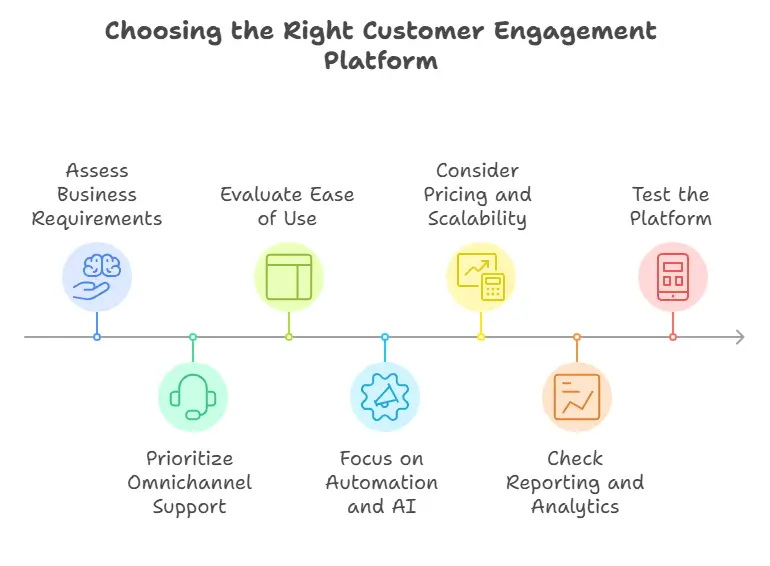
Selecting the ideal customer engagement platform depends on your business needs, budget, and goals. Here’s a step-by-step guide to help you make the best choice:
1. Assess Your Business Requirements
Start by identifying what your team needs most from a platform. Consider:
- Key Features: Do you need AI-powered chatbots, live chat, or tools for video calls and screen sharing?
- Business Scale: Are you a small team looking for affordability or a large enterprise needing scalability?
- Integration Needs: Do you rely on specific tools like CRMs or popular messaging channels?
2. Prioritize Omnichannel Support
Look for platforms that allow you to engage customers on various messaging channels, including live chat, email, and social media. This ensures you can meet customers wherever they prefer to communicate.
3. Evaluate Ease of Use
A user-friendly customer messaging platform is crucial for both agents and customers. Consider platforms that offer intuitive interfaces and customization options for seamless onboarding.
4. Focus on Automation and AI
Features like AI-powered automation and chatbots can save time and enhance efficiency. Automation tools are especially helpful for handling repetitive customer inquiries and enabling proactive engagement.
5. Consider Pricing and Scalability
Budget is always a key factor. Platforms with starter plans, team plans, or even free plans are great for small businesses, while those with enterprise solutions are better for larger companies.
6. Check Reporting and Analytics
Robust reporting tools can provide insights into agent performance, customer satisfaction, and engagement trends. Look for platforms with custom dashboards to monitor these metrics effectively.
7. Test the Platform
Take advantage of free trials and demos to explore the platform’s capabilities. Ensure it aligns with your workflow and supports your goals, like improving service efficiency or generating leads.
Conclusion
Finding the perfect LivePerson alternative depends on your specific needs, whether it’s engaging customers across multiple channels, enhancing customer satisfaction scores, or leveraging AI-powered automation to streamline operations.
Each platform in this guide offers unique features tailored to businesses of different sizes and industries. Whether you’re a small team looking for affordability with Desku or an enterprise needing robust scalability with Zendesk, there’s an option to fit your goals.
Before making your decision, take time to assess your requirements, prioritize the features that matter most, and explore free trials to experience each platform’s capabilities. The right choice will not only improve customer interactions but also empower your team to deliver a seamless customer experience.
FAQ Section
1. What is the best LivePerson alternative for small businesses?
For small businesses, Desku and Tidio are excellent options. Both platforms offer affordable plans, intuitive interfaces, and essential features like live chat, AI-powered chatbots, and customization options.
2. Which platform is best for omnichannel support?
Platforms like Zendesk and Intercom provide robust omnichannel support, enabling businesses to engage customers across various channels like email, live chat, voice calls, and social media.
3. Are there free alternatives to LivePerson?
Yes, Freshdesk and Tidio offer free plans with basic features, making them suitable for startups and small teams. While limited in functionality, these plans can handle core customer interactions effectively.
4. Which platform offers the best automation features?
For businesses prioritizing AI-powered automation, Chatbot.com and Intercom are great choices. They provide advanced chatbot capabilities and tools for proactive engagement.
- About the Author
- Latest Posts
Gaurav Nagani was the Founder of Desku, an AI-powered customer service software platform.
- Email Management: Best Strategies, Tools & Tips for SaaS and Ecommerce
- Shared Inbox Guide: Definition, Benefits, Tools & Best Practices 2025
- LivePerson Pricing Exposed: What They Don’t Show You on Their Website
- Automate Customer Support with AI A Practical Guide
- Desku vs UsePylon: Which One Scales Better for Startups?


